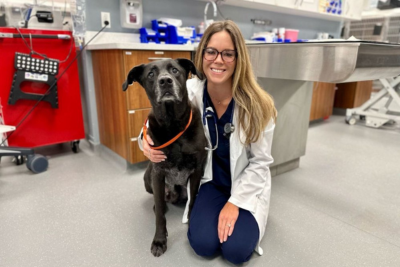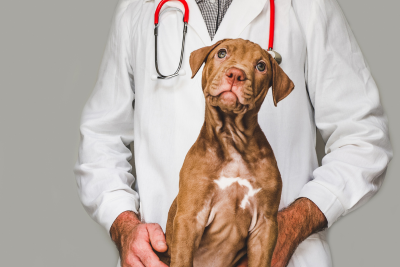
Pre-Veterinary Program
The UConn Department of Animal Science offers a comprehensive curriculum and experiences to prepare our undergraduate students to apply to veterinary school. The Animal Science program focuses on the study of domestic livestock, companion animals and animal products. While pursuing a BS degree, our Animal Science students learn how animals function through the study of genetics, physiology, anatomy, nutrition and behavior. In addition to Animal Science requirements, students interested in a career in veterinary medicine must complete courses in biochemistry, microbiology and physics, depending on the requirements for specific veterinary schools the student intends to apply to.
Our department boasts modern teaching facilities and barns with all of the farm species (dairy and beef cattle, horses, sheep, swine and poultry) located within walking distance right on campus. The program provides many opportunities in the classroom, research laboratories, jobs in animal care, independent study and internships to "learn by doing" with hands-on experiences at the core of our curriculum. Hands-on experience working with animals increases the potential of acceptance into veterinary school. We have a solid record of success with our undergraduate students gaining admission into veterinary schools across the globe.
Students interested in applying to veterinary school must ensure they meet the entrance requirements for a specific veterinary school..pdf Specific admission requirements vary slightly among veterinary colleges, but all emphasize a strong science background. Veterinary medicine programs are four years in length and admission is competitive. Successful applicants must maintain a high grade point average in their undergraduate career. Our faculty advisors guide students through their undergraduate career and the veterinary school application process. Our students typically apply to veterinary college in September of their senior year of their B.S. program.
At a Glance
With veterinary school acceptances rates of up to 85%, our graduates are ready to continue on into highly competitive 4-year programs in veterinary medicine. The only university in New England with all livestock species housed outstanding animal facilities right on campus, UConn students have unparalleled hands-on opportunitoes both in the classroom and beyond.
News & Achievements
The UConn Department of Animal Science has allowed me to gain hands-on experience at the barns, while taking engaging classes that have deepened my understanding of topics that will help me in vet school.
Frequently Asked Questions
Frequently Asked Questions for Prospective Pre-Vet Students
Yes. The Department of Animal Science offers a pre-vet area of interest option for students majoring in Animal Science. Students are admitted to the Department of Animal Science and take courses that are required for the major at UConn and are required to apply to their veterinary schools of interest. The Sequence of Courses for the pre-vet area of interest within animal science is designed to meet the entrance requirements of veterinary schools in the U.S. and abroad and provides numerous opportunities for valuable hands-on experience with animals.
There is no college/school of veterinary medicine in the state of Connecticut to obtain a D.V.M., only undergraduate and graduate degree programs in Animal Science.
Students must perform well in coursework (i.e., get good grades) and obtain practical experience with animals. This could be under the direction of a veterinarian, in a research lab or working in one of our animal units.
Veterinary Medical School Admission Requirements can be found online. Some schools require the Graduate Record Examination (GRE), so individual vet schools need to be consulted regarding admission requirements.
For the most current information on veterinary school costs, strategies to save money when applying, and helpful tools for pre-veterinary students as they embark on a career in veterinary medicine, visit https://vetschoolbound.org/
In two ways:
First, the Department of Animal Science has a strong commitment to undergraduate education, including advising and teaching. Faculty and staff get to know their students/ advisees on a first-name basis and are readily accessible for consultation. This open approach provides students with the opportunity to "keep on track" with their academic pursuits. This commitment to undergraduate education by our faculty has been recognized by a number of faculty and staff awards in teaching and advising including those below:
- UConn Alumni Association Excellence in Undergraduate Teaching
- UConn Undergraduate Student Government Educator of the Year Award
- Outstanding Undergraduate Faculty Advisor for the University of Connecticut
- UCAHNRAA Outstanding Staff Award
- UCAHNRAA Excellence in Teaching Award
- CAHNR Research Excellence Award
- Kinsman Teaching Excellence Award
- First Year Experience Teaching Award
- USDA Teaching Fellow
- University Teaching Fellow
Second, all Animal Science majors gain critical hands-on experience working with animals. Students benefit from the most extensive domestic animal facilities in New England. Specifically, we have facilities that house dairy, beef cattle, sheep, swine, horses and poultry. Most importantly, the barns are only a 5-10 minute walk from the George White Building, home of the Department of Animal Science. This provides unparalleled opportunities for students to gain important hands-on experience in formal class work, undergraduate research, or as part-time employees at the barns without needing a car on campus.
There are many, many employment opportunities available to students that graduate with a BS in animal science. Some examples of possible careers are listed at our career opportunities page where you can also find a listing of companies that employ animal science graduates.
Take as many science and math courses as your school allows. These can include biology, chemistry, physics, physiology, algebra, trigonometry and calculus. In addition, take courses that provide writing experience and also take at least three years of one foreign language. If you have the option to take college credit courses at your high school, it will give you greater flexibility in course selection during your college pre-veterinary medicine program. In general, the better the academic background a student has, the better prepared they are for classes at UConn. You should meet all the admission requirements in the undergraduate catalog of the University of Connecticut.
In addition, obtaining experience working for a veterinarian is an excellent way to determine if veterinary medicine is an appropriate career choice. Most veterinary colleges require this type of work experience prior to application. Other positions working with animals may also enhance your veterinary college application.
Yes, AP classes in almost any subject help. Taking AP classes in the kinds of classes listed above will provide you with an excellent background in those subjects. AP classes in other subjects, such as history, language, and English will also give you good background for general education classes at UConn. Achieving a good score on AP tests can allow you to meet specific course credits at UConn, and allow for greater flexibility in course scheduling. A word of caution: some veterinary programs do not accept AP credit in required courses. If you pass the AP exam, check with your pre-vet advisor to determine if accepting the AP credit is appropriate for you.
No, UConn does not offer a program leading to certification as a veterinary technician. Typically vet tech programs are two-year associate degree programs. However, many of our students work as veterinary technicians while pursuing their degree and some get full-time jobs after they complete their Animal Science degree. In many cases veterinarians are seeking employees that have broad-based animal backgrounds with knowledge in animal management, physiology, nutrition, and health and disease and a vet tech degree is not required. The Animal Science program offers students the opportunities to gain this experience.
Click here to see a list of schools in the Northeast that offer vet tech programs. To view programs offered in other parts of the U.S. visit https://www.edumed.org/online-schools/vet-tech-programs or https://vettechnicians.org. For a comprehensive page that covers vet-tech schools, requirements, and job information visit AllAlliedHealthSchools.com.
Visit our Veterinary School Acceptances page for a full list of veterinary schools that UConn Animal Science students have been accepted to.
Yes, the University of Connecticut has an agreement with the University of Glasgow, School of Veterinary of Medicine. For additional information, visit the UConn Global Experiential Global Learning program page here: https://app.studyabroad.uconn.edu/.
Frequently Asked Questions for Current Pre-Vet Students
Yes, there is an excellent publication that would be of great interest to you. It is published by the Purdue University Press, Lafayette, IN. The title is "Veterinary Medical School Admission Requirements in the United States and Canada (Current Year)" (ISBN# 1-55753-314-8). You can also visit https://applytovetschool.org/ for up to date information on vet school admissions requirements.
Yes, very much so, and this should be a consideration in deciding to which schools to apply. The Veterinary Medical School Admission Requirements book given above lists the current tuition rates and the applications and admissions for out-of-state students. The applicant/admission ratios are inflated because most students apply to several veterinary schools, however, they give some guidance as to the acceptance rates of the various schools.
First you need to understand that application classification is based on the state of residency and not the undergraduate school you attend. Most veterinary schools classify applications as from a state resident, from a contract-state resident or from someone usually referred to as "at-large" or "non-resident". Currently the state of Connecticut does not have any contracts and Connecticut residents are in the non-resident (at-large) category for all veterinary schools.
You should apply before each school's published deadline. Submit your application 1 year before you plan to attend (note: certain schools have fall, spring, and summer starts). Deadlines range from September through early January, with the VMCAS app due in September. This will normally be the summer leading into senior year and students should plan to complete most of the veterinary school requirements by the end of the seventh semester.
Yes. The Student Doctor Network (SDN) is a nonprofit educational organization has been recommended by our Pre-Vet students as a valuable resource for students preparing for, and applying to, Med School, Vet School, etc. The site includes sections for Medical, Dental, Veterinary, Rehab Sciences, Audiology, Ophthalmology, Pharmacy, Podiatry, and Psychology. The forums are very helpful – especially in preparing for the interview.
Most of our qualified Pre-Vet students apply to several schools. It is costly to do so but enhances possibilities for admission.
It is wise to take them in the second semester of your junior year for experience and again in the summer leading into your senior year after completing more course work. Schools require only one test, but not all schools require the same test. In addition, many schools no longer require applicants to submit GRE scores. UConn's Career Services in the Wilbur Cross Building will have application booklets with test dates and deadlines. Application deadlines are several weeks before the tests are given, so be sure to plan ahead. Your advisor will help you if you have additional questions.
In general, this is not necessary as such courses are expensive and most students can do well using one of the many books or CDs on how to prepare for GRE exams. However, some students will benefit from the discipline of a formal course. If you have questions, see your Pre-Vet advisor.
Yes, veterinary schools appreciate patience and persistence. You can use the extra year to enhance your qualifications and application. For example, additional work experience, or graduate course work may be helpful. Be sure to contact the schools and ask what can be done to strengthen your application.
Many students do this. In addition to strengthening your application to veterinary school, a Masters (MS) degree opens other career opportunities after veterinary school. Many complete their M.S. at a university where there is a veterinary school and sometimes even take a course or two offered by the veterinary school.
The animal science curriculum provides an excellent background for many career opportunities. In addition, the recommended courses in the basic sciences for Pre-Vet students open opportunities in graduate school, biotechnology and other professional programs (See "Employment Opportunities" section).
Frequently Asked Questions for Pre-Graduate Students
Most graduate programs offer top graduate students an assistantship. This is also called a stipend and will assist you in meeting your financial obligations while completing your degree. At the University of Connecticut, an assistantship includes a salary, health benefits and tuition remission. In addition to your research project and academic programs, the assistantship carries additional responsibilities, including assisting in teaching courses and other departmental needs.
Yes, The Peterson Guide is a very good source of information. A current copy is on file in the Kinsman Library, Room 110 of the George White Building.
No. Typically all programs are a combination of course work and research. The most common plan is the Master of Science (Plan A) in which a significant research project is undertaken and results in a written thesis. Some programs have more emphasis on course work (Plan B) and do not require a written thesis. The latter is generally not considered desirable if further graduate work is contemplated.
Students may also choose to pursue a doctoral degree. The most common plan is the Doctor of Philosophy, which focuses on promoting discovery through scientific research. Often regarded as the ultimate achievement in academia, the Doctor of Philosophy is typically associated with particular career paths.
Only some schools require standardized testing (i.e., GRE), so students should identify which tests are necessary to take, if any. Students should plan to take any required standardized testing in spring or early summer between their junior and senior year. Note: The UConn Department of Animal Science Graduate Student Program does not require a GRE score.
Unlike veterinary school, there are rarely specific course requirements for admission to graduate school, but coursework in the basic sciences, such as biology and chemistry, is important. Preference is given to students with GPAs above a 3.0. Courses in biology, chemistry, biochemistry as well as in animal science related classes are also an advantage.
The UConn Department of Animal Science helped me get into vet school by offering me hands-on experiences and learning, as well as giving me a support system that helped me thrive during my undergraduate career.


